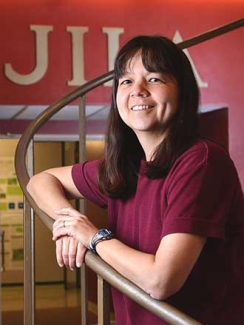JILA Fellow Deborah Jin’s research was literally the coolest. She created the first fermionic condensate and the first quantum degenerate molecular gases, expanding our knowledge of how atomic and molecular behavior changes at ultracold temperatures. Jin was not only a prominent physicist, she was a role model and mentor for young scientists, particularly women.
“She was a physics giant. Her research on fermionic gases helped us advance our field in an impressive way,” said JILA Fellow Ana Maria Rey, who worked with Jin. “Besides being one of the most prominent physicists in our field, she was a caring mother, a fantastic wife and a supportive colleague and friend."
Although Jin passed away in 2016, her research continues to influence physicists around the world. The Australian Research Council Centre of Excellence for Engineered Quantum Systems (EQUS) is now offering Deborah Jin Fellowships to two early career female scientists.
“This prestigious fellowship is a great testimony to Debbie’s continuing international impact in research and training,” JILA Fellow Tom O’Brian said.
EQUS is Australia’s national quantum research and development initiative, similar to the United States' National Quantum Initiative or Europe’s Quantum Flagship Initiative. The Deborah Jin Fellowships are three-year appointments at either the University of Queensland, University of Sydney, Macquarie University and University of Western Australia. Applications are due August 5, 2019 at 8:00 AM AEST.



 The Physics Frontiers Centers (PFC) program supports university-based centers and institutes where the collective efforts of a larger group of individuals can enable transformational advances in the most promising research areas. The program is designed to foster major breakthroughs at the intellectual frontiers of physics by providing needed resources such as combinations of talents, skills, disciplines, and/or specialized infrastructure, not usually available to individual investigators or small groups, in an environment in which the collective efforts of the larger group can be shown to be seminal to promoting significant progress in the science and the education of students. PFCs also include creative, substantive activities aimed at enhancing education, broadening participation of traditionally underrepresented groups, and outreach to the scientific community and general public.
The Physics Frontiers Centers (PFC) program supports university-based centers and institutes where the collective efforts of a larger group of individuals can enable transformational advances in the most promising research areas. The program is designed to foster major breakthroughs at the intellectual frontiers of physics by providing needed resources such as combinations of talents, skills, disciplines, and/or specialized infrastructure, not usually available to individual investigators or small groups, in an environment in which the collective efforts of the larger group can be shown to be seminal to promoting significant progress in the science and the education of students. PFCs also include creative, substantive activities aimed at enhancing education, broadening participation of traditionally underrepresented groups, and outreach to the scientific community and general public.